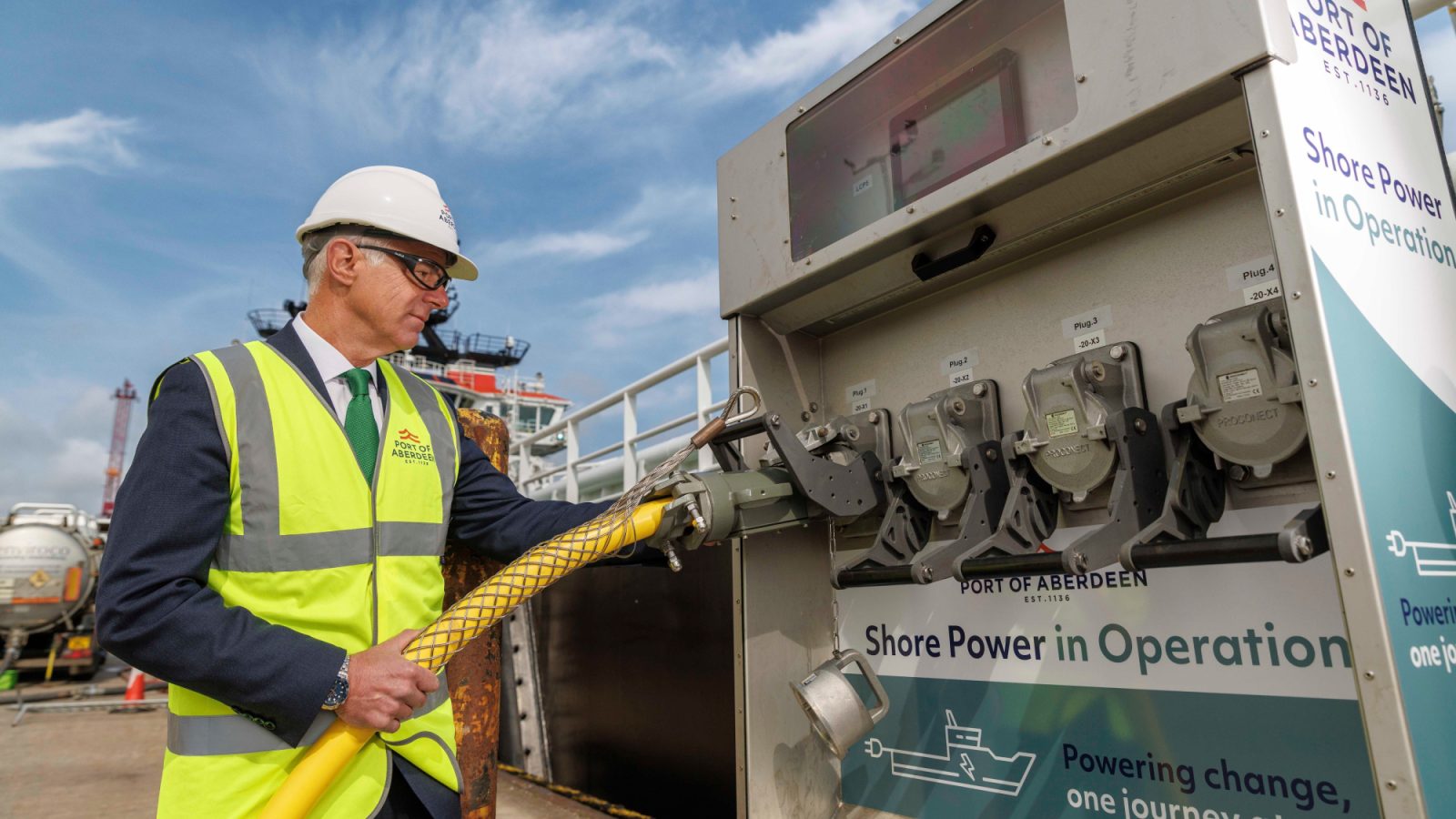Scotland’s largest maritime decarbonisation project is now live at the Port of Aberdeen, providing green shore power for vessels at eight berths in the port’s North Harbour.
The concept of shore power is simple: allowing vessels to plug directly into power from the port’s renewable energy tariff, instead of running on their own fossil fuel auxiliary engines while at berth – saving on fuel and cutting CO2 emissions, pollution, and noise.
For Port of Aberdeen, a Trust Port at the heart of the community with ambitions to be the UK’s first port to achieve net zero by 2040, the impact will be significant.
Maritime Minister, Mike Kane said: “This is a major achievement for Port of Aberdeen and I am proud to have supported it through the UK SHORE programme - it shows what can be achieved when we put our full energy behind decarbonisation.”
The new infrastructure, installed by PowerCon, the market leader in shore power technology, could cut up to 60,000 tonnes of CO₂ equivalent over the next 20 years. This would remove the emissions equivalent of around 2,140 cars from the road every year.
The first vessel to be connected to the new system was OSM Thome’s NS Iona, one of five vessels retrofitted to accept shore power as part of the project.
The newly electrified berths are part of the ‘Shore Power in Operation’ demonstrator, supported by the Department for Transport’s Zero Emissions, Vessels and Infrastructure (ZEVI) competition funded by UK Government and delivered in partnership with Innovate UK. This joint public-private partnership at Port of Aberdeen represents a combined investment of £4 million in new clean energy infrastructure.
The port has also installed shore power infrastructure to service vessels on two berths Regent Quay as part of Bibby Marine’s electric Service Operation Vessel ZEVI project. Additionally, work is almost complete to install shore power infrastructure for Serco NorthLink’s passenger ferries, funded by Caledonian Maritime Assets Limited. This adds to the port’s existing shore power facilities which supports operational activities for its renewable energy customers and towage providers.

Longer-term, Port of Aberdeen has ambitions to expand its shore power infrastructure to supply green electricity at more berths throughout its 7,600m quayside. New Tyndall research [https://tinyurl.com/PoAshorepower] also sets out how UK Government policy changes could support faster deployment of shore power at other ports.
Bob Sanguinetti, CEO, Port of Aberdeen, said: “Port of Aberdeen’s net zero journey has taken a significant step forward. Our Shore Power in Operation demonstrator is the single biggest maritime decarbonisation project in Scotland to date.
“It represents a £4million investment in clean energy and will be a game-changer for Port of Aberdeen and our valued customers, who will benefit from an 80% reduction in their carbon emissions while at berth.
“We’re in the business of clean energy, and we’re driving and supporting the energy transition in the North Sea. That’s why it’s so important that we’re leading from the front – investing in the future of the port and a cleaner, greener way of working which benefits our environment, community and customers as we strive for net zero by 2040.
“Public and private sector partnership is essential to move green infrastructure projects from feasibility studies and demonstrators to deployment at scale.”
Minister Kane continued: “We have charted a course to zero emission shipping by 2050, and it’s innovative projects like this that will help get us there. But decarbonisation isn’t just good for the environment, it’s good for jobs and for the economy, with green fuels and technology boosting growth and revitalising our coastal towns and cities.”
The Shore Power in Operation project is part of the Zero Emissions Vessels and Infrastructure competition (ZEVI), which was announced in February 2023, funded by UK Government and delivered in partnership with Innovate UK. As part of ZEVI, the Department for Transport allocated over £80m to 10 flagship projects supported by 52 organisations from across the UK to deliver real world demonstration R&D projects in clean maritime solutions. Projects take place in multiple locations from the Orkney Isles to the south west of England
Port of Aberdeen led an industry and academic consortium, including OSM Offshore, Tidewater Marine UK Ltd, Connected Places Catapult and the University of Manchester’s Tyndall Centre, with support from Buro Happold and Energy Systems Catapult, to deliver the ground-breaking initiative.
Peter Selway, Shore Power Specialist at PowerCon, said: “PowerCon is extremely proud to be part of this landmark project. Pollution from vessels is a serious - yet often overlooked - environmental and public health issue. For example, vessels at berth account for 46% of greenhouse gas emissions from domestic shipping, and shore power has the potential to eliminate these emissions entirely.
“Shore connection technology is well-established and widely used internationally, but the UK has been slow to adopt it despite the clear and compelling benefits. Port of Aberdeen is leading by example, showing real commitment to renewable, sustainable solutions, and we’re delighted to support them on that journey."